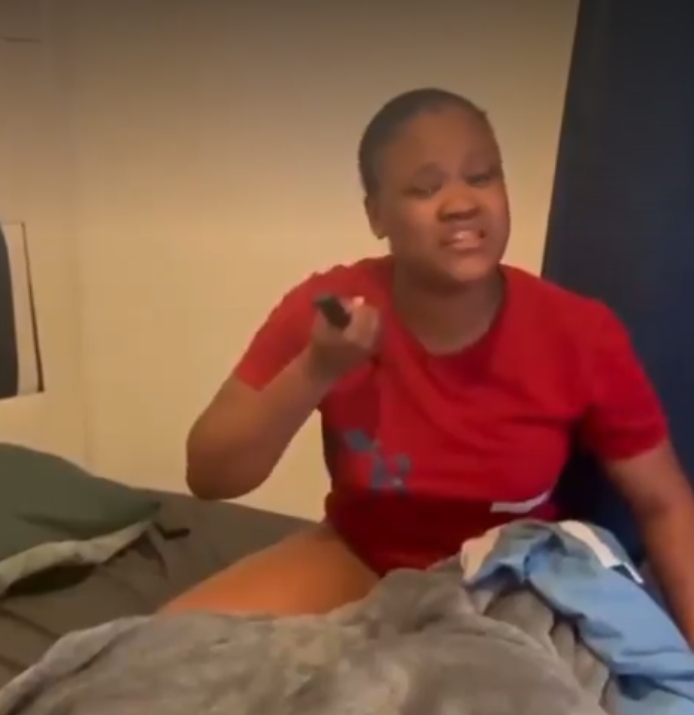
Drama in South Africa as Heartbroken Lady Threatens to End Her Life After Boyfriend Reposts Another Woman’s Video on TikTok

Social media has once again been thrown into a frenzy following the circulation of a disturbing video showing a young South African lady threatening to take her own life after discovering that her boyfriend reposted another woman’s TikTok video. The emotional clip, which has now gone viral across multiple platforms including TikTok, X (formerly Twitter), and Instagram, has sparked widespread concern and debate among users about the dangers of social media obsession, emotional dependence, and mental health in relationships.
In the video, the visibly distraught lady is seen crying uncontrollably as she records herself, lamenting bitterly about her boyfriend’s perceived betrayal. She expresses deep heartbreak, accusing her boyfriend of disrespecting her by reposting another woman’s video on his TikTok page. Her words, filled with pain and desperation, reveal that she felt completely devalued and humiliated by the act. According to her, she had invested all her love and loyalty in the relationship, only for him to publicly “choose another woman” in her presence by resharing her content.
Moments into the video, the young woman reportedly made several troubling statements suggesting she no longer saw any reason to live. Her voice shook as she mentioned feeling unloved, unappreciated, and invisible in the eyes of the man she had trusted deeply. Viewers could see she was holding back tears as she hinted at ending her life, saying she couldn’t handle the emotional pain anymore. The clip, which appeared to have been recorded in her room, quickly made its way online after being reposted by several users who claimed they were trying to raise awareness and call for intervention.
The shocking incident has generated thousands of reactions, with many people expressing concern for the lady’s mental state while others criticized the boyfriend’s actions for allegedly triggering such emotional distress. Some users argued that the situation highlighted how toxic social media validation has become in modern relationships. Others, however, insisted that the young lady’s extreme reaction pointed to deeper emotional instability that had little to do with the TikTok repost itself.
One user on X commented, “This is so heartbreaking. People really need to understand how fragile emotions can be. What might seem like a small action online can deeply hurt someone who’s already struggling.” Another wrote, “We’ve normalized public affection and online validation so much that a simple repost can now destroy relationships. This is tragic.” Meanwhile, others were more critical, arguing that no relationship should have so much control over one’s mental health. “No man or woman is worth losing your life over,” another user stated bluntly.
Reports suggest that the lady’s friends and online followers have been trying to reach her since the video went viral, urging her to stay calm and seek professional help. Some commenters claimed to have recognized her from her previous TikTok posts where she often shared fun dance videos and romantic clips with her boyfriend. The drastic shift from cheerful posts to this dark, emotional outburst shocked many who had followed her content for months. Several users have been tagging South African authorities and mental health organizations in a bid to locate her and ensure her safety.
Psychologists and relationship experts have also weighed in on the situation, emphasizing the urgent need for mental health education and emotional support systems in young relationships. According to them, many people, especially in the social media era, derive their self-worth and sense of belonging from how their partners express love online. As such, when something as minor as a repost or “like” is perceived as disloyalty, it can trigger deep emotional pain for individuals who are already emotionally dependent or battling self-esteem issues.
The incident also reignites ongoing discussions about how social media has blurred the line between public and private relationships. In the digital age, acts like sharing, liking, or reposting another person’s content can easily be interpreted as emotional betrayal, particularly when couples build their relationships around constant online validation. Many users noted that the South African lady’s reaction, though extreme, reflects a broader issue of how deeply people tie their emotional stability to digital activities.
This latest incident comes at a time when suicide awareness campaigns are gaining momentum across Africa due to rising cases of depression and self-harm among young people. South African organizations such as the South African Depression and Anxiety Group (SADAG) have repeatedly urged the public to take online expressions of distress seriously, especially when individuals explicitly mention suicidal thoughts or intentions. SADAG has emphasized that social media users should report such videos immediately to help authorities intervene before it’s too late.
As of now, there are mixed reports about the lady’s current condition. Some unverified claims circulating online suggest that friends managed to reach her in time and that she is receiving emotional support. However, others insist that the situation remains unclear and that her family has not made any official statement. Regardless, the viral clip has left a lasting impact on social media users, serving as a stark reminder of how fragile mental health can be when tied to online relationships.
The video has also triggered a wave of self-reflection among young people who admit to having experienced emotional breakdowns over similar online issues. Many confessed that the pressure to maintain a “perfect” social media relationship often leads to feelings of insecurity, jealousy, and emotional burnout. A user commented, “We’re all pretending to be happy online, and when our partners don’t validate us publicly, we feel rejected. It’s destroying us.”
While the young woman’s emotional outburst has sparked sympathy, it has also prompted discussions about personal boundaries and the importance of mental resilience in relationships. Social media analysts have called for platforms like TikTok to strengthen their support systems for users showing signs of emotional distress, including automatic alerts or helpline suggestions when keywords like “end my life” or “can’t go on” appear in a post.
This heartbreaking incident serves as yet another wake-up call about the silent mental health struggles many people face behind their online personas. It also emphasizes the importance of empathy, understanding, and early intervention. As conversations continue online, many are hoping that the South African lady gets the help she needs and that others battling similar thoughts realize that no heartbreak, betrayal, or social media drama is worth ending one’s life over.
For anyone struggling with suicidal thoughts or emotional pain, mental health advocates are urging people to reach out to trusted friends, family members, or professional counselors. In South Africa, individuals can contact the Suicide Crisis Helpline at 0800 567 567 or reach out to SADAG via SMS at 31393 for free and confidential support. The viral video may have started as another case of online heartbreak, but it has opened a broader conversation about love, digital relationships, and the urgent need to prioritize mental well-being in a world dominated by social media validation.
Watch the video


